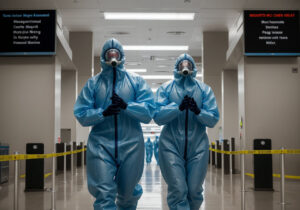You know the type: the smirking former business partner who scammed you back in 2019. Suddenly he’s back in town, dressed like he belongs in a budget NFT gallery, talking like he wants to “reconnect.” You shut it down with a handshake and a lie: “I’m booked for the next three years.”
That same night, local news reports a man hospitalized with what doctors think is Lassa fever. No one seems to know how he caught it. But then you scroll your local message board and see a post: “Is it true [REDACTED] is the guy in the ICU? He told me he visited a monkey brothel last month. Wtf.”

It clicks. That sleazy idiot didn’t just try to scam you again—he brought death back from the jungle.
Two days later, he’s dead. Official cause? Unknown hemorrhagic-like pathogen. Tests negative for Lassa, Marburg, Ebola, and hantavirus. One doctor calls it “Ebola’s bastard cousin.” Still unidentified.
The Tick Tock Begins
You’re feeling pretty manly until 4 PM hits you like a sledgehammer.
It starts with a stomach cramp. Then another. Then you have to run to the bathroom. Diarrhea. Then nausea. Your abdomen is on fire. You curl up on the floor, sweating like you’re detoxing. You try to tough it out. Pain is part of the game, right?
Wrong.
By midnight, your fever hits 41°C. Your neck is stiff. Your head feels like someone drove a railroad spike through it. Your stomach—it’s not cramps anymore, it’s agony. You can’t walk. You can barely speak. And when the paramedics get to you, they look nervous.
Welcome to enteroneuropathic Candara Pangi.
Diagnosis: Hell

At the hospital, they confirm it: you’ve got the same thing your ex-partner had. Only difference? You got it early. Maybe you shook his hand. Maybe he coughed on your gym bag. Doesn’t matter. It’s inside you now.
You’re wheeled into ICU. Tubes go in. The nurse says something about CRP levels over 450 and oxygen saturation dipping into the 80s. You nod like you understand. But you don’t.
Because your brain doesn’t work.
Between the heavy-duty painkillers, anxiolytics, and the virus itself attacking your nervous system, you’re a ghost. Your memory is gone. Days blur into each other. You have a vague recollection of someone discussing your liver enzymes. Something about abscesses. You look in the mirror and your skin has dark patches. You weigh 50 kilograms.
You were 81 before.
Exit Wound
It takes two weeks for your vitals to stabilize. You’re discharged another two weeks after that, wheeled out like a World War I survivor. You can walk, sort of. But you can’t think. You can’t remember your bank code. You start crying because the lights are too bright.
Your doctor tells you your cognitive deficits are from “enteroneuropathic complications.” You nod. You pretend to understand.
The Climb Back
Most people would spiral. You don’t. Because you’re not most people. You’re a man with a spine forged in fire. So you start small:
- Breathing drills
- Cold showers
- Bodyweight squats with trembling knees
- Flash cards to rebuild memory
- Audio logs to track your mental stamina
You fight like your life depends on it.
Because it does.
One Year Later
You’re not fully back. But you’re close. Your weight’s back to 68 kg. Just 1 kg shy of being a real man again. You deadlift 100 kg for reps. Your mind’s sharp enough to write, to code, to talk like a human again. Another year and you’ll be stronger than before.
The virus didn’t take you.
But it tried.
And it left you something better than antibodies: a reminder that discipline is stronger than death.

